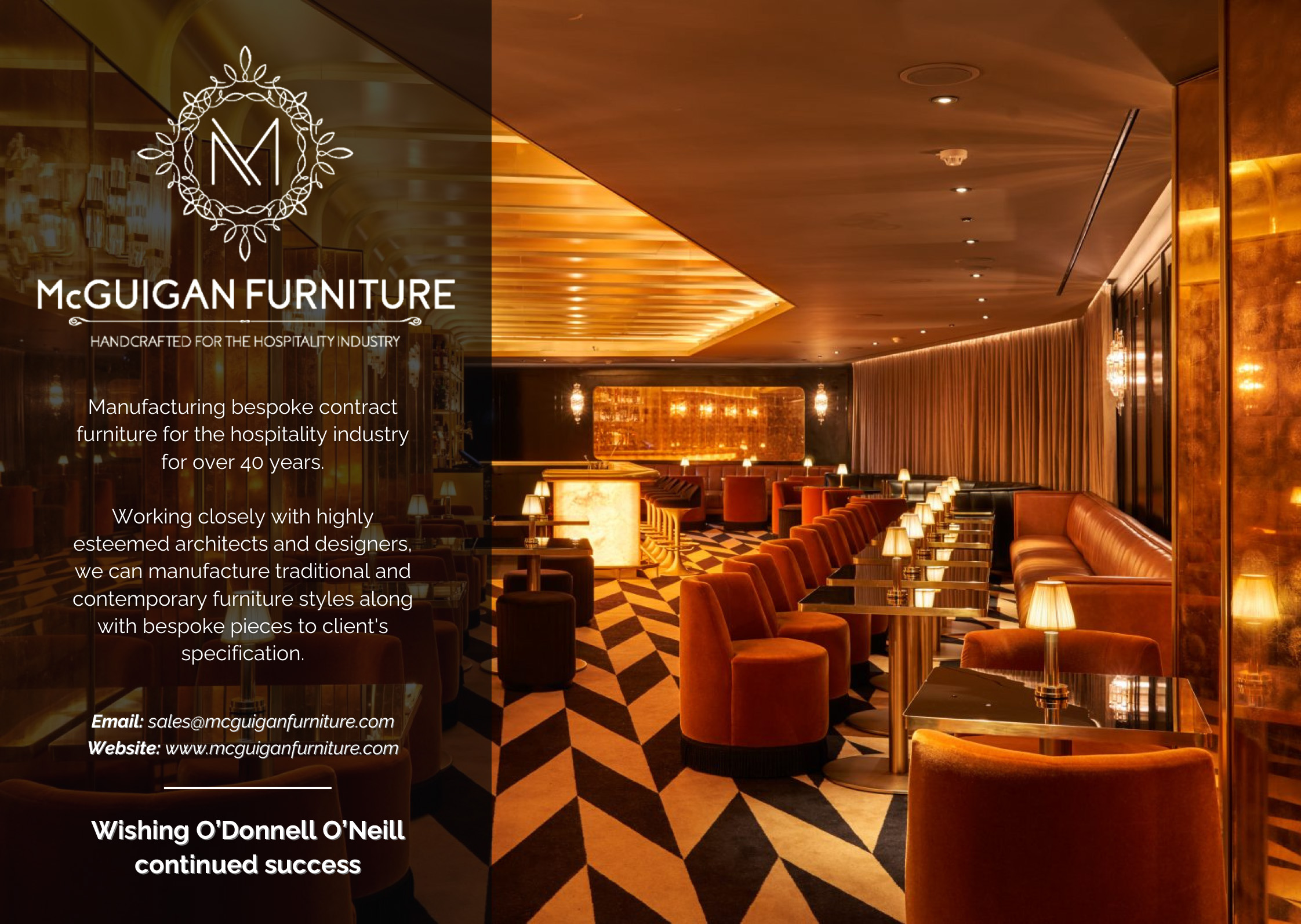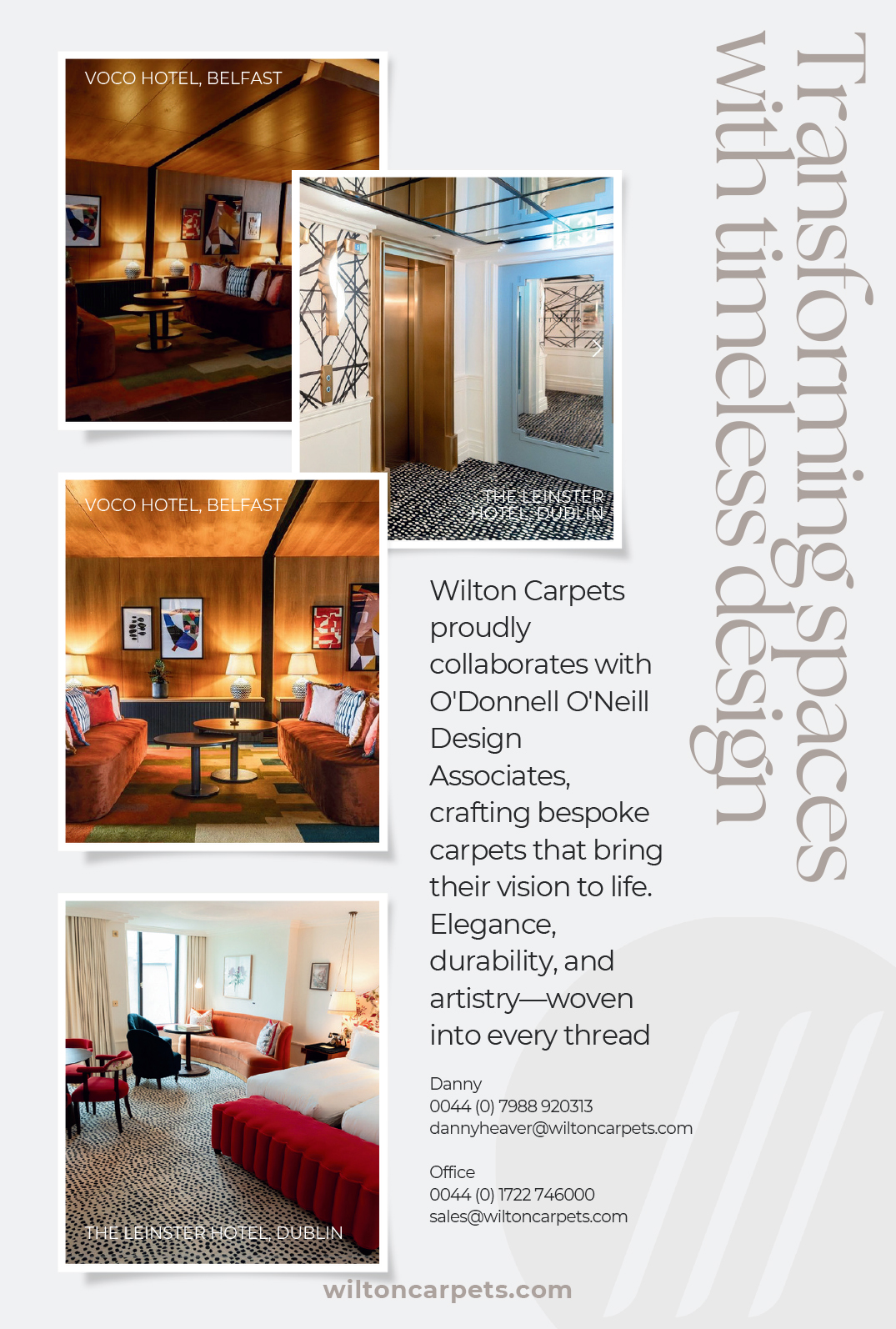
7 minute read
Hospitality Harmony
'Beautiful teamwork goes into our design', Aisling Healy and Marie Smyckova, directors at O’Donnell O’Neill Design, talk to H&R Times.
The Leinster Hotel was on a mission to create a new world of class. Owners of the new hotel, located on a corner of Merrion Square in Dublin, wanted to embrace the history of its surroundings: art galleries, design studio, museums. So they partnered with one of Ireland’s most versatile and experienced design firms: O’Donnell O’Neill. Since its establishment in 2001, this firm has excelled in creating iconic hotels, bars, restaurants and entertainment spaces of all sizes. Across an almost quarter century of experience, the studio has refined its skills in architecture, design, visual artistry.
Some of these skills filter down from the top – via founders Graham O’Donnell and AnnMarie O’Neill – but the recruitment of fresh talent helps too. Earlier this year, O’Donnell O’Neill appointed two new directors: Aisling Healy and Marie Smyckova who have been working with O’Donnell O’Neill for a number of years. H&R Times met up with the directors to talk about a few of the studio’s exciting new projects. Hospitality is at the heart of all their work, remarks Aisling. “Even when a client comes to us for a residential or an office job, it's often because they like the look of one of our hospitality projects.”
The Leinster Hotel jet propels this reputation. Dublin’s latest luxury 5-star features 55-bedrooms across four floors - each room features elegant patterns, tactile materials, vibrant artwork and bespoke furniture and fittings. The Jean-Georges Rooftop Bar & Restaurant is situated on the fifth floor with views over Dublin and features 3-meter-high olive trees and hand-painted murals in a terraced area. O’Donnell O’Neill designed the Collins Club bar on the ground floor, off the lobby as a nod to Georgian glam: dimmed lighting and decadently designed ceilings. The bar, like the rest of the hotel, fits neatly into the property’s Georgian surroundings. The Georgian era was the starting point for the client and the designer alike.
“The Leinster is designed to fit in with the surroundings,” says Marie Smyckova. “The Collins Club fits in with the building’s existing old Georgian windows. We took inspiration from classic materials. There’s a timeless look and feel to the hotel.” Marie Smyckova continues: “Sometimes it is harder to start work with a completely blank canvas. It’s about being in tune with what people feel when they enter a space. Even someone who knows nothing about architecture or interior design can sense a well-designed space”
2024 is not an easy time for owners and operators within the hospitality sector who are faced with accelerated costs of business and lower budgets for new and refurbishment projects. The repercussions of Brexit are still providing a challenge within design and construction. Yet through close collaboration with their clients, O’Donnell O’Neill will make it work.
At the start of any project, the designers weigh up a number of variables. “Location, clientele, budget, environmental factors, are all important considerations when we are building a brief with the client,” explains Aisling. The location of a property such as the Leinster Hotel in Dublin has very different requirements to Wilde by Staycity, at Liverpool Street London, which the studio also designed. The design in Wilde is more modern, echoing “the bohemian spirit” of East London.


But everything begins with a conversation with the client. “We have many conversations with our clients prior to starting the concept because we need to get to the root of what they are looking for,” says Marie. Sometimes the client will know exactly what they want. On other occasions, O’Donnell O’Neill create a draft through talking to everyone from the chef to the general manager. They take into consideration everything from staff uniforms to the menu, in order to craft a bigger visual picture.
Every job is different. For example, Cliste Hospitality commissioned the studio to work closely with them on Voco, Belfast, on the site of a former Radisson Hotel. This hotel had remained unchanged for almost two decades but O’Donnell O’Neill completely re-invented the premises. They installed an illuminated tree in the entrance lobby, repurposed and reupholstered existing lounge furniture and installed new bar areas. The designers refurbished the 120 en-suite guestrooms and replaced an outdated dining room with a stylist Italian-themed restaurant. Voco, Belfast is more than just a refurb: it’s a reimagining, a highquality experience delivered in a cost-effective way.



Sustainability is almost always part of the plan. “We have been very conscious of sustainability over the years in regards to using local supply chains and local suppliers,” says Marie. “We collaborate with loads of artists, signage makers, painters from Ireland.”
The 55 bedrooms in the Leinster feature unique artworks by Irish artists which were commissioned for each room, echoing the creative flair throughout the hotel. “We're really proud of those [artistic] relationships that we've been building for years,” Marie continues. “I think it's reflected in the end result. Beautiful teamwork goes into our design.”
Salvaged material plays a big role in the Leinster’s eco-conscious design thanks to suppliers such as Wilsons Yard, Derry’s Furniture and Pure fitout. “The ceiling in the restaurant upstairs is made of salvaged timber: a sustainable way to save and preserve trees,” says Aisling. Nolan’s Group played their part in providing bespoke tiles and glazing for the hotel’s Collins Club.
Sustainability is also a big part of the makeup at Daata, an Indian restaurant in Blackrock which O’Donnell O’Neill brought to fruition. The designers used reclaimed wood to craft internal details and sourced items – screens, furniture, artworks, accessories, etc. – from salvage yards. They filled the environment with traditional antiques from Pakistan and India and in collaboration with the client made clever use of found objects. “We reimagined various antiques,” explains Marie Smyckova. “Screens as wall finishes; buckets as basins in the bathrooms. Reusing items is a creative approach to sustainability.”
The brief for Daata was to create a standalone restaurant and bar space for indoor and outdoor dining that celebrates Pakistani and Indian culture. But across all their work, O’Donnell O’Neill are inventive as budgets become squeezed: “We’ve had to think smarter in our design, material and installation choices, while still maintaining a level of design quality.”
O’Donnell O’Neill are not all about €10 million budget projects like the Leinster. Sometimes it’s all about keeping clients on top of their game for a lower price tag. “We have a huge array and vast portfolio of different types of projects,” explains

Aisling. “We're not only working for clients with massive budgets. We're approachable, not intimidating, and we don't just work on the big flashy stuff.”
By way of example, they tell H&R Times about Conlon's Wine Bar in Bray: “A little space that transports you to a different time. The windows and doors were taken out and redesigned under our design direction. The signage outside, the whole shop front, is all encompassing. The character doesn't start and stop with the interior.”

“Getting the right person to design your venue and advise you has a huge impact on commercial viability,” says Aisling. “When things are designed correctly and budget is considered, it will also save you money.” Marie nods: “The most important thing is for people to have an amazing experience when they visit the places we design.”
A designer can make or break any hospitality business. O’Donnell O’Neill, time and time again, have proven their ability to do the former.



